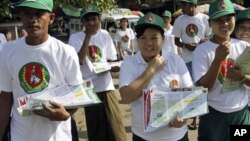Sunday's elections in Burma have been denounced as a sham by western nations who see them largely as a way to legitimize Burma's military dictatorship. Election rules guarantee that military-allied parties will win a majority. Campaign debates are non-existent, the government has barred outside election monitors and the news media are heavily censored.
But despite the heavy-handed tactics, inside the country, the public reaction to the vote is more mixed. The fact that there is a vote at all and some political campaigning is a stark change for a country that has not held an election since 1990.
Burma has banned independent journalists from covering the election. But VOA has been speaking with a freelance reporter in Rangoon who has been living in the region for two years. VOA is not disclosing her identity because of the official ban on foreign journalists.
Are people in Rangoon as pessimistic about the election as those critics outside the country?
"There is very little political apathy going on at the moment. I think a lot of the foreign press is reporting that people are either too cynical or don't care or don't know enough about politics. Or they feel despair because they're afraid that nothing's going to change. But the mood in the city at the moment, especially when you talk to candidates who are campaigning, people are really excited that for the first time in basically 20 years, there has been open political activity, open political discussion.
[For example,] taxi drivers are talking about politics. The other day I was in a taxi, and the taxi driver starts saying, 'Myanmar. We're like North Korea.' And I said, 'No, North Korea's worse.' He then said, 'No. It's true. We even have a nuclear program with them.' And normally taxi drivers would never talk that openly."
Do you think just the fact that there is some sort of political process that people are allowed to take part in is empowering them to discuss issues that they normally wouldn't?
"Absolutely. It's a huge change. And the fact is there is an election that is being approved by the regime. There is open political activity going on. People are campaigning in the streets. People are talking about problems that they want fixed and that they want their candidates to be addressing. People are talking about what they don't like about the current regime. People used to only talk about that in confidence, in strict confidence, if they knew that you weren't somehow going to use that information to get at them."
Do you think that people expect to see changes after the election as well, or is the process itself enough?
"I think a lot of people are happy with the process itself. People are saying, 'Look, whether things change or not, we're having an election. Maybe this election isn't the important one. Maybe it's the next one that's going to be in five years. Maybe that's the one where we'll see real change. Maybe this is just a test run, but this test run is really important.' So there are people who have that opinion... exactly what you just said, it's just the fact that it's happening.
And then there are some people who are really cynical about it and they say, 'Look the vote is stacked. Just by sheer numbers. It's totally stacked in favor of the USDP [Union Solidarity and Development Party],' which is the proxy party for the current regime. And people think that is just further entrenching the regime. And then there are other people who say a lot of the people who are running on behalf of the USDP don't want to be politicians. These are people who were forced to be politicians. The USDP has a candidate running in every single constituency. There is not a single constituency that does not have somebody from that party running."
Among the opposition groups, Aung San Suu Kyi's National League for Democracy party decided not to take part in the election. Since then, there has been a fair amount of second-guessing about that decision. Do people discuss the NLD's decision?
"Yes, people talk all the time about what a shame it was. That they've really shot themselves in the foot. The NLD is no longer a legal party, but the legacy of the NLD has not left the country for sure. The NDF, the splinter party, there's this really sort of toxic rivalry between the NDF and the NLD, and a lot of the other independent candidates are sort of condemning the rivalry. Not condemning either one of the parties, but just condemning the rivalry, saying it's silly, it's a waste of time, it's not good for the political climate. But it does seem like it's a shame that they've lost a really wonderful opportunity to find a way to reawaken the party's spirit."




